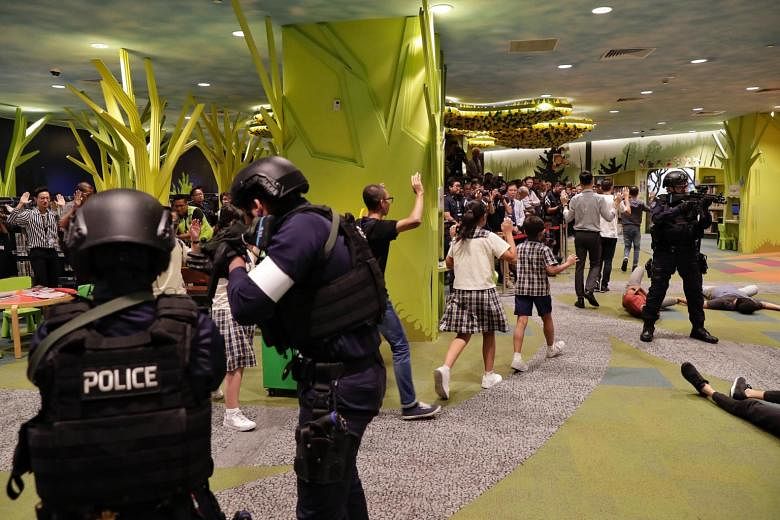SINGAPORE - In the event of a terror attack here, Singaporeans would display stronger negative reactions if it had been carried out by a foreign extremist Muslim organisation than if Buddhists, Christians or Hindus had been behind it, a survey has found.
In analysing a 2017 survey of just over 2,000 Singaporeans, researchers from the Institute of Policy Studies (IPS) also found that older and less well-off people were less likely to retain trust and openness in Muslims in such circumstances.
However, non-Muslims who had more interracial interaction were more likely to express solidarity with Muslims after an attack, pointing to the "importance of providing ample avenues for interracial mingling", the researchers said.
The report, released by the IPS on Tuesday (Sept 25), is believed to be the first public study of its kind to examine perceptions of different religious groups after a hypothetical terror attack.
The lead author of the report - titled Community Relations Amidst The Threat Of Terror - is Dr Mathew Mathews, senior research fellow at the IPS. Mr Leonard Lim, research associate at IPS, and Ms Shanthini Selvarajan, research assistant at IPS, are co-authors.
Singaporeans were asked to respond to a scenario in which news reports of a bomb exploding on an MRT station platform had emerged, with the incident killing 15 people and wounding 40.
They were further told that authorities had confirmed the identity of those behind the terror attack, with four scenarios: that it was either an extremist Buddhist; Muslim; Christian; or Hindu overseas organisation that was responsible.
If the attack was by a Muslim group, 48 per cent of respondents were quite or very likely to be suspicious of a Muslim stranger walking around in their neighbourhood.
This compared to 40 per cent for Buddhists and Hindus, and 35 per cent for Christians.
Less-educated respondents, or those less well-off as measured by housing types, were also more likely to show less trust and openness after an attack.
Across most of the survey findings, those residing in one- and two-room Housing Board flats fared differently from those residing in three- to five-room flats, executive apartments and private housing.
"This is indicative of the exclusion those at the extreme end of the socio-economic status may be experiencing, which fuels their prejudices and biases," said the report.
It added that this minority group may not be receiving full access to programmes that promote multiculturalism and interracial interaction.
The study also found "substantial levels of mistrust" between races in Singapore, especially by the majority Chinese community of the minority Malays and Indians.
This was measured by asking respondents what proportion of people of each race they thought would return their wallet if they had dropped it in a shopping mall.
A majority of Chinese respondents said they could not trust Indian and Malay people to hand it back; they were more likely to trust a fellow Chinese person to return it.
However, non-Muslims who had more interracial interaction in the previous two years - such as friendships or shared cultural experiences with Malays - were less likely to display Islamophobic tendencies after an attack by a foreign Muslim group.
They were also more likely to express solidarity with Muslims after such an incident.
The researchers added: "This suggests that efforts to deepen understanding and integration among different communities in Singapore, through events in the grassroots, schools and other such organisations, should continue as the country seeks to build up social ballast before any terror attack."
Dr Mathews said: "The survey is of course limited in that we cannot predict with certainty how any of us will actually feel if such a terror incident occurred, and our level of anger and anxiety.
"However, this study at least gives us an indication, at a time when everything is peaceful, about whether there are already some gaps in our social cohesion."
The survey of Singapore citizens, conducted by consumer research firm Media Research Consultants and funded by Mediacorp, questioned 1,016 Chinese people, 504 Malays, and 511 whose ethnicity was classified as Indian or others.
The youngest participant was 21, with 15 per cent of respondents aged over 65.
Data was collected from surveys carried out between April 21 and May 24 last year.


